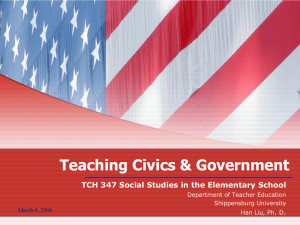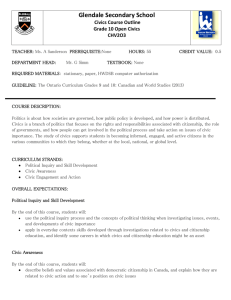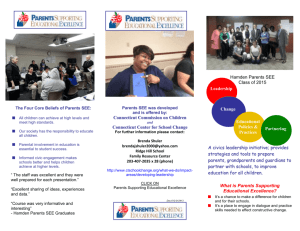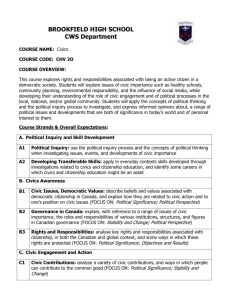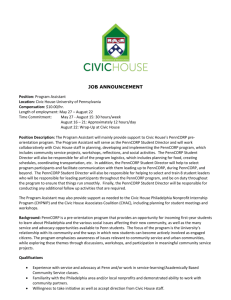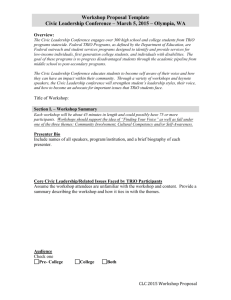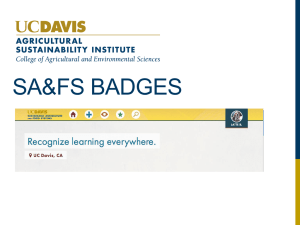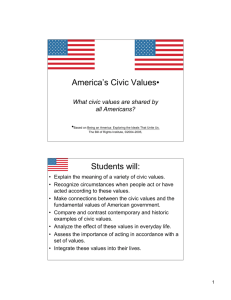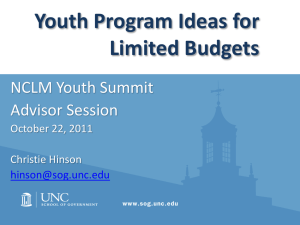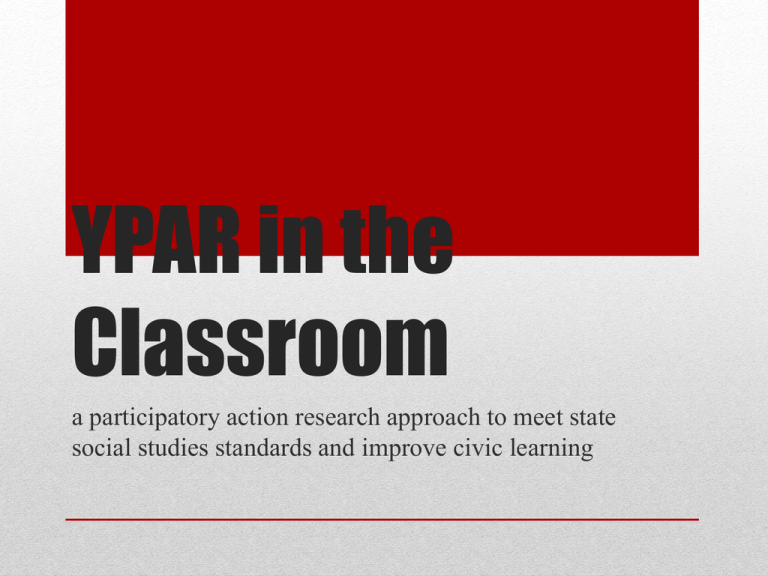
YPAR in the
Classroom
a participatory action research approach to meet state
social studies standards and improve civic learning
• Mayida Zaal, Montclair State University
• Beth Rubin, Rutgers University
• Jennifer Ayala, Saint Peters College
University Collaborators
•
•
•
•
•
Anne Baney
Amir Billips
Brian Ford
Millie Harris
Shana Stein
Teacher Collaborators
Standard 6.3: Active
Citizenship in the 21st Century
All students will acquire the skills needed to be
active, informed citizens who value diversity and
promote cultural understanding by working
collaboratively to address challenges that are
inherent in living in an interconnected world.
- New
Jersey Core Content Curriculum Standards for Social Studies
• Three-quarters of 4th and 12th graders
and
• Four-fifths of 8th graders in the U.S.
…rank below proficient on this national
measure of civic knowledge.
NAEP Civics 2010
The New York Times reported that “… a
smaller proportion of fourth and eighth
graders demonstrated proficiency in civics
than in any other subject the federal
government has tested since 2005, except
history, American students' worst subject"
(5/4/11).
NAEP Civics 2010
“Traditional”
approaches to
social studies
instruction
High school
students reflecting
on social studies
instruction
“All we did was watch movies,
handouts, dittos.”
“Teachers just give you the book,
read out of it, do the work, that’s it.”
“The teachers’ don’t teach…they’ll
give us a worksheet and we’ll have to
read it and then just answer the
questions.”
“…we talk about things that
happened like 13,000 years ago, that
don’t got nothing to do with today.”
When youth have the opportunity to engage actively with
investigation and analysis of civic problems that directly
concern them, they can develop more active and
empowered identities as citizens.
Educational experiences that foster sociopolitical
development and critical inquiry can contribute to the civic
empowerment of youth from marginalized communities.
Sociocultural, situated
frame for civic learning
youth
participatory
action
research
Project
Citizen
Inquirybased/active
learning
(progressive
education)
Inquiry traditions
Bullying
School violence
Test score gap
Stereotyping
LGBT youth
School conditions
Violence in the
community
Refugee camp
conditions
- Emphasizes youth empowerment,
rooted in a critical analysis of
race, class and power
- Critical analyses of social
inequalities
- Critique of traditional modes of
research
- Commitment to incorporating
youth as co-researchers
- Aims to empower, liberate
Youth participatory
action research
Traffic lights
Town recycling
Obesity
School lunches
Teen pregnancy
Waste
• Develop a commitment to active
citizenship and governance
• Provide knowledge and skills
• Foster sense of competence and
efficacy
• Learn to monitor and influence
public policy
• Understand the importance of
citizen participation
Project Citizen
“learning by doing”
“democracy in action”
“creating a caring
community of
learners”
“funds of knowledge”
“There is, I think, no point in the
philosophy of progressive
education which is sounder than its
emphasis upon the importance of
the participation of the learner in
the formation of the purposes which
direct his activities in the learning
process” (Dewey, 1938, p. 77).
Progressive education :
inquiry, active learning
design
based
research
Is both “generative and
transformative,” creating
new forms of learning
based on specific ideas
about practices, studying
those innovations, and
using analysis of this
process to refine the
practices under study, gain
insight, and produce models
of successful innovation
(Kelly, 2003, p.3).
The Team
• researchers, teachers, graduate
students, undergraduates
The Design
• Spring 2010 Think Tank
• Summer 2010 Curriculum
Development Workshop
• 2010-11 Implementation
• Data Collection
• Professional Learning Community
• Analysis: Ongoing
YPAR in the classroom should :
• be student-centered, built upon students' knowledge and
histories
• be a collaborative learning experience
• foster social critique, dissent, and critical analysis,
• engage with questions/concerns that have a real life application.
• develop and/or build on research-based skills and tools.
• help students “acquire the skills needed to be active, informed
citizens who value diversity and promote cultural understanding
by working collaboratively to address the challenges that are
inherent in living in an interconnected world” (NJCCCSSS 6.3).
Think Tank: Design Principles
• Unit 1: Building a Team and Selecting a Problem for
Study
• Unit 2: Research and Analysis
• social, political, historical context of the problem
• understanding YPAR, choosing research methods
• methods modules
• data analysis
• Unit 3: Taking Action
• Civic change
• Determining action
The Curriculum
School 1
School 2
Demographics
47% African American
4^% Asian American
5% Latino
43% White
91% African American
<1% Asian American
8% Latino
Course
1. Law and Politics
2. Civics /Government
Institute, service
period
3. Social Justice
Institute, senior
project
1. Social justice course
2. Facing History and
Ourselves course
Number of classrooms
Approximately 15
classrooms
2 classrooms
Teachers
12 teachers
2 teachers
Implementation
•
•
•
•
•
•
•
Gangs
Religious intolerance
School lunches
Homophobia
Bullying
Homelessness
Ethnic/racial tensions at
school
•
•
•
•
•
•
•
Waste management
Teen pregnancy
Human trafficking
Eating Disorders
Sex Education
Criminal Injustice
Children in Conflict
Topics selected
•
•
•
•
•
•
Surveys
Interviews
Focus groups
Slam books
Participant observation
Secondary source inquiry
Research methods
•
•
•
•
•
•
•
Public service announcements
Awareness campaigns
Fundraising efforts
Educational interventions
Videos
Workshops for middle school students
New media campaigns (Facebook, Twitter, etc...)
Actions planned
• “If enough young people care and take initiative, big
things can happen and a lot can get accomplished.”
• “The understandings that I have gained from the project
is that small projects can make a large difference if
executed well and that it is really important to inform the
students of these issues.”
• “I have begun to understand that I can make a difference
and address real problems in the world.”
Participating Students Say…
•
•
•
•
•
•
Fitting the project into the existing curriculum
Keeping up with student topics as they emerge
Learning to do and teach research
Navigating school constraints
Balancing research with desire for action
Helping students define meaningful yet do-able project
Challenges
•
•
•
•
•
Development of research skills
Development of critical thinking skills
Authentic writing and presentation tasks
Learning to collaborate - a “group worthy” task
Studying a problem in historical, political, cultural
context - holistic social studies approach
Benefits: Academic
• Civic skills: how to frame a problem, collect data on that
problem, consider how to address it, advocacy,
communication
• Civic knowledge: how government works, power
• Civic orientation: I have a voice, I am able to tackle an
issue that concerns me, my community and its issues are
important, I can work together with peers to improve
society
Benefits: Civic learning
• Development of an online YPAR Portal and
accompanying professional development module to bring
the curriculum to a wider audience and facilitate teacher
and student sharing across schools, states, countries
• Seeking partners to revise curriculum, participate in
training, collaborate on researching the scaling up of this
initiative
Next Steps


